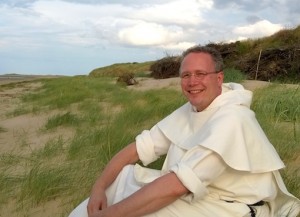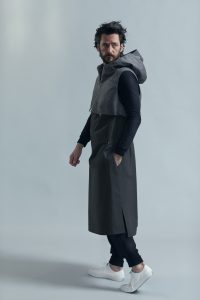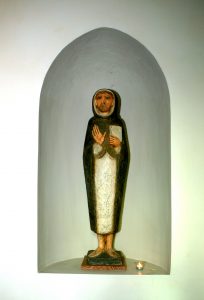

ominicaan Richard Steenvoorde loves his habit. It shapes him, stops him in his tracks, connects him to his brethren in the world and in history. A meditation on authenticity evoked by the 'New Habit’ by Borre Akkersdijk.
Click here for an article on the New Habit

Richard Steenvoorde o.p.
We live in an inflated society. Every day, we are confronted with more inflated emotions, ideas and egos. Many suspect that this daily inflation has become unsustainable. ‘This has to stop’, we shout to someone else. And that person should be less tolerant, or intolerant, less progressive, or conservative, less naive or less sombre.
And while we shout this message, we inflate ourselves to look stronger. Unconsciously, we all contribute to the rising tensions. Now and then, you come across people who are putting their fingers in their ears. They can’t stand it any longer. Something is going to explode.
Would it be possible to change the situation without a further inflation through words? Dutch designer Borre Akkersdijk thinks so. As he thought-experiment, he designed a ‘new habit’ for the Dominicans.
What would you wear, if you started today, in order to stand in solidarity with the people on the one hand, and yet be recognisable as a religious on the other hand, preaching the Good News to an anxious crowd? Furthermore, and typically Dutch, the new design had to be practical, sustainable, and usable across the world in different contexts using local materials. Being recognisable, without putting people off. Preaching without words. Authentic.
 It is a challenging experiment. Not because I can see myself wearing this ‘new habit’. My own habit, with its impracticalities, its long history, and its worldwide recognisability is dear to me. The habit does not concur with what I, what we, find practical. Instead, it shapes me, stops me in my tracks (sometimes literally, when my rosary gets stuck), to become silent, to pay attention, to listen to the voice of Him who speaks in the sound of an evening breeze (1 Kings 19).
It is a challenging experiment. Not because I can see myself wearing this ‘new habit’. My own habit, with its impracticalities, its long history, and its worldwide recognisability is dear to me. The habit does not concur with what I, what we, find practical. Instead, it shapes me, stops me in my tracks (sometimes literally, when my rosary gets stuck), to become silent, to pay attention, to listen to the voice of Him who speaks in the sound of an evening breeze (1 Kings 19).
So, what is the use of this fashion-experiment at the end of the Jubilee of our Order? May be, it helps us, Dutch Dominicans, to focus on the new challenges ahead. Shortly, a new provincial chapter will be celebrated. Given the high average ages of the brethren, this might be our last chapter as a province.
So we have to face the question, what is the essence of what has been achieved so far, what can be handed on to the future? And we need help, from the brethren worldwide, in order to create space for the new brothers, currently in formation, to carry out the Dominican mission authentically forward.
In that context, I understand the ‘new habit’ as a question of an outsider, a modern-day innkeeper in terms of our founding story, who is asking us to be authentic, without being off-putting, authentic across all sorts of borders. The question remains whether this can be achieved by introducing new clothes, the outside, or is this actually about the inside, our inner attitude towards people?
The habit has become for me a constant sign of the task that my preaching is not about me, but about God, already at work in human lives. The habit prevents me from inflating my ego, rather, through its otherworldliness, it tempers my ego.

Statue of St Dominic in the dominican convent of Huissen.
But there is more. I am aware that there are brothers and sisters who wear, or would like to wear, our habit in extraordinary and dangerous circumstances, in poverty, in refugee camps, in exile, under violence and suppression. I have had the privilege of meeting some of them. They have a name, and I know their faces. Wearing my habit is also a sign of solidarity with them. Am I doing justice to their preaching when I wear our habit?
Authenticity, sustainability, back to our roots, building on 800 years of history, in global solidarity with the Order and the Church. These will be, I pray, the important words at our upcoming provincial chapter. Let us not inflate ourselves, because we have new vocations.
Let us not turn away from others “because now we can take care of ourselves again, thank you”. We need each other in our fragility, rooted in the places where we are, and yet across al borders, authentic and true to the Gospel. And in solidarity with a country, a continent, a world afraid of rising tensions and humanly created disasters.
Richard Steenvoorde OP
student brother of the Dutch Province at Blackfriars, Oxford















